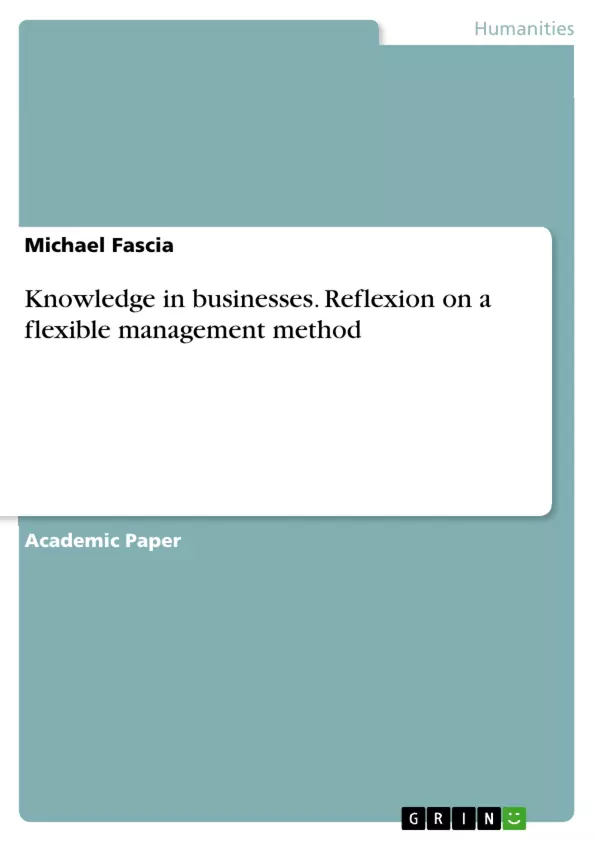In this discussion, the author reflects on the value given to knowledge in a business context and deliberate a contrary philosophical perspective which does not conform to prevailing knowledge theory. It will be considered why, if knowledge is key for business success and competitive advantage, the transfer of knowledge within an organisation remains problematic. Whereby, if the creation of knowledge before transfer is recognised is a significant factor in determining a starting point for analogous scrutiny, then what makes this focal point so difficult to establish and measure?
It is therefore considered parallelism between agents who believe propositions and the formal system that derives proposition. In doing so, we synthesise from current literature and research, the epistemic principal of ‘knowledge’, which underpins the understanding of the many congruent knowledge transfer theories, in a business context. To do this we reflect on Lindström and the epistemic states of Spohn, wherein, we can draw on descriptions of conditional doxastic maps, as a natural extension of contemporary Kripke models. We conclude the epistemic principle of ‘knowledge’, which underpins the plausibility of comparisons between epistemically distinguishable knowledge transfer, must include perspectives and doyennes from a recognisable, not implied, value standpoint.
Inhaltsverzeichnis (Table of Contents)
- Introduction
- Overview
- Business Context
- Positioning
Zielsetzung und Themenschwerpunkte (Objectives and Key Themes)
This discussion aims to explore the value of knowledge in a business context and challenge prevailing knowledge theory by examining the difficulties in knowledge transfer within organizations. It delves into the epistemic principle of 'knowledge' and its implications for understanding knowledge transfer theories in a business setting.
- The role of knowledge in business success and competitive advantage
- Challenges associated with knowledge transfer within organizations
- The epistemic principle of 'knowledge' and its connection to knowledge transfer
- The significance of validity in knowledge transfer scenarios
- The influence of individual perspectives and experiences on knowledge interpretation
Zusammenfassung der Kapitel (Chapter Summaries)
- Introduction: This chapter introduces the discussion's focus on belief, knowledge, and probability within a business context. It establishes the foundational principles of belief revision and the significance of an agent's frame of reference.
- Overview: This chapter explores the concept of belief revision and its connection to probabilistic understanding. It highlights the role of validity in knowledge transfer and the subjective nature of knowledge.
- Business Context: This chapter examines the POPC lens approach and its application to knowledge transfer in a business environment. It emphasizes the importance of considering the context and perspectives of both the knowledge source and recipient.
- Positioning: This chapter explores the implications of individual perspectives and experiences on knowledge interpretation. It highlights the need to consider the foundational ethics and potential fallacies associated with knowledge in a business context.
Schlüsselwörter (Keywords)
This discussion explores key concepts such as knowledge transfer, epistemic principle, belief revision, validity, subjective perspectives, and business context. It delves into the complexities of understanding and interpreting knowledge in a practical business environment, recognizing the significance of individual experiences and perspectives.
Frequently Asked Questions
Why is knowledge transfer within organizations often problematic?
Transfer is difficult because knowledge is subjective and depends on the individual's frame of reference, making it hard to establish a common starting point for measurement.
What is the "epistemic principle of knowledge" in a business context?
It is the underlying foundation that determines how knowledge is understood, interpreted, and valued within congruent transfer theories in a practical environment.
What is the POPC lens approach?
The POPC lens is a method used to examine knowledge transfer by considering the specific context and the individual perspectives of both the source and the recipient.
How does belief revision affect business knowledge?
Belief revision relates to how agents update their propositions based on new information, which is a key factor in how knowledge is adapted and transferred in an organization.
What are "conditional doxastic maps"?
Based on the work of Spohn and Lindström, these maps describe epistemic states and frames of reference that help model how individuals process and transfer knowledge.
- Citar trabajo
- Michael Fascia (Autor), 2019, Knowledge in businesses. Reflexion on a flexible management method, Múnich, GRIN Verlag, https://www.grin.com/document/459892



